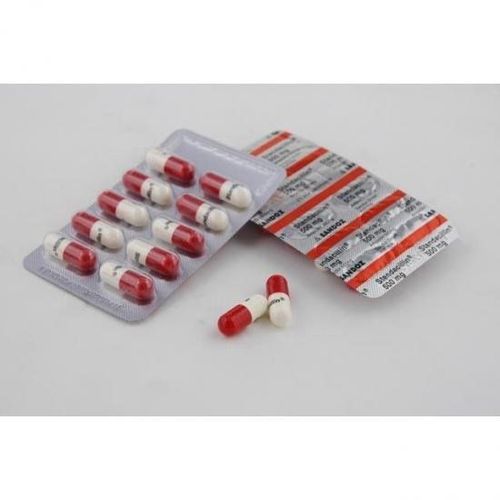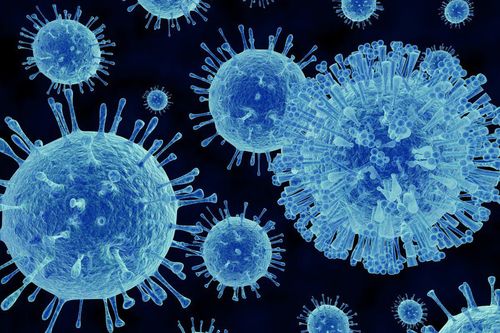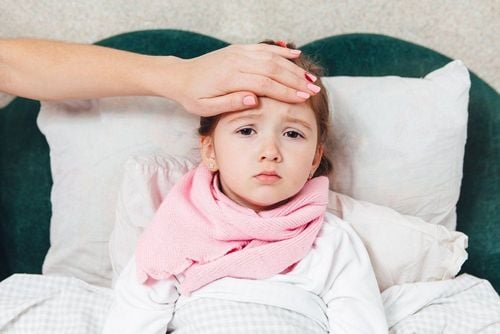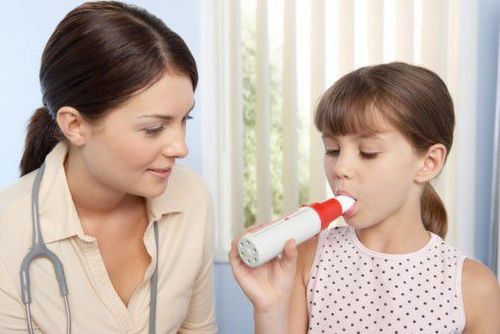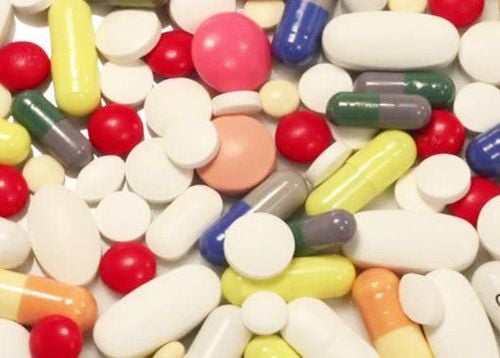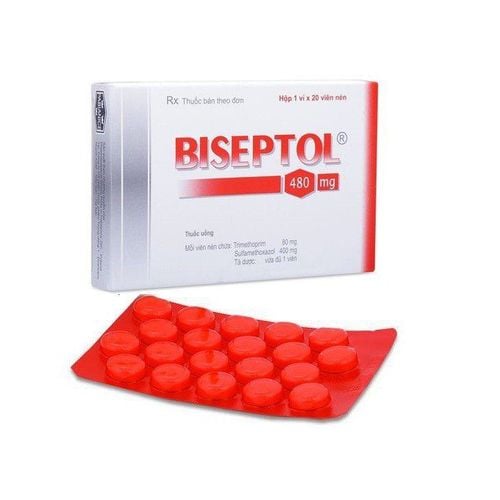This is an automatically translated article.
Hot weather makes young children easily lose water and electrolytes because the body produces a lot of sweat to cool off. Due to the immature resistance, children are very susceptible to respiratory and digestive diseases... Proper care of children's health in the hot season will help them adapt well to the weather and increase their resistance to diseases. surrounding harmful agents.
Here are the questions related to children's health issues in the hot summer season consulted by pediatricians at Vinmec International General Hospital:
Master, Doctor Nguyen Thi An - Hospital Vinmec Ha Long International Hospital Master, Doctor Ngo Thi Oanh - Vinmec Ha Long International Hospital CKI Doctor Bui Thi Ha - Vinmec Ha Long International Hospital 1. Friend Dinh Thi Thu Trang (35 years old, Nga Tu So Ward, Dong Da District, Hanoi): Doctor, my son has had diarrhea for 5 days now and has not yet felt better. Before going to school, my son had a digestive disorder, so from the time he saw that he had diarrhea, the family gave him a lighter diet and rehydrated him with oresol continuously, but it only helped with the frequency of rustling but not completely. Normally, if my child has diarrhea, it will take 1-2 days after taking the medicine, so I am so worried. The doctor told me how many days the diarrhea will go away and when should I go to the doctor?
Master, Doctor Nguyen Thi An - Vinmec Ha Long International General Hospital: Hello! Acute diarrhea is a condition in which a child has loose stools more than 3 times/24 hours, the patient will have a 2-week illness. So your child has acute diarrhea. Usually children with diarrhea are treated for 5 to 7 days. In case your child has been treated for 5 days and still has loose stools, you should check the medications you are taking, take your child to the doctor, have the stool tested for dysbacteriosis, fungal and bacterial infections.. in feces or not.
2. Mr. Pham Thanh Son (Bai Chay Ward, Ha Long City, Quang Ninh): Hello Doctor, my baby is 4 years old and going to kindergarten. Recently, my teacher informed me that there were many children with diarrhea in my class. I researched online that diarrhea can be transmitted from one child to another, so I was quite confused as to whether I should let my baby stay at home for a while or not. So is diarrhea contagious and is there any way to prevent it, doctor?
Master, Doctor Nguyen Thi An - Vinmec Ha Long International General Hospital: Hello! Diarrhea is a contagious disease. Sources of infection include:
Feces of patients or healthy people carrying rotavirus . Manure will contaminate the environment, especially water sources. In addition, may contaminate food and other items. Mode of transmission:
Rotavirus is transmitted by fecal-oral route, in addition, it can be transmitted by respiratory route. Children can be infected both before and after an illness with diarrhea. Food contamination: choose food that is no longer fresh, due to lack of hygiene in cooking, both raw and cooked food, cooked food left for too long, food containers are not clean. Do not wash your hands before cooking, before eating, after using the toilet and after cleaning children. You should leave the child at home, ask the teacher to notify the parents whose children are showing signs of acute diarrhea or digestive disorders, stay home from school, take care of them completely before going to class, to isolate them from healthy children. . Report back to the school to control food safety and hygiene and guide and clean before and after birth for children to eat as well as to go to the toilet.
Methods to prevent children from having diarrhea :
Isolate the source of infection (sick people). Do not share dishes, drink water to avoid your child being infected with other diseases as well as infecting others (because of poor resistance). Food must ensure food safety and hygiene, clean water sources, food processing tools, and healthy food handlers. Change to age appropriate diet. Wash hands before eating and after defecation. If the disease recurs continuously, it is necessary to change the eating habits of food safety and hygiene (absolutely Do not go to restaurants), if after a period of implementation, it no longer continues, it is due to a change in habits. good habit. If it doesn't go away, you need to see a doctor to find out the cause. 3. Reader Hoang Ha Thu (Primary teacher in Gia Lam, Hanoi): Hello Hospital, I need advice on whether to receive fluids for diarrhea and what should be given? My son is 3 years old this year, after traveling for 3 days, he has a fever with diarrhea. Currently, I go to a gastroenterologist, and I am prescribed oresol to drink and only give more fruit juice if I can't eat. However, for 2 days now, I only gave him porridge to eat diluted with oresol, but he kept spitting up after drinking it. Besides oresol, what fluids should be given if my child has diarrhea if my child cannot take oresol? During the 3 days of going to the beach because he couldn't eat seafood and strange foods, the family still maintained the habit of giving him rice and food every day, so it was okay, when he returned home, he had a slight fever. then abdominal pain, diarrhea, vomiting continuously.
Master, Doctor Nguyen Thi An - Vinmec Ha Long International General Hospital : Hello! If the diarrhea is mild, you should give the child oresol electrolyte replacement fluid properly, if the child vomits, cannot drink, or takes ORS properly, but the child still has diarrhea and dehydration, intravenous fluids are needed.
Electrolyte rehydration solution: lactate ringer, sodium chloride 0.9%, sodium bicarbonate 1.4%...).
In case your child has just vomited, has a fever, has loose stools, he has been given ORS but he is not getting better, so you should take him to a health facility for examination and treatment.
4. Ms. Nguyen Thi Mai Anh (28 years old, office worker): Dear doctor, my child is 6 years old, has been being treated for diarrhea for 3 days now, besides eating porridge and drinking oresol, he is very lazy to drink water. although I know that having diarrhea causes dehydration so I have to rehydrate constantly. Drinking oresol is a must, so I have to be strict before she accepts it, and besides that, she only likes to drink carbonated water, milk, .. which causes difficulty in digestion when she is sick. diarrhea. I was going to give him fruit juices to change, but I read online that fruit juices also contain a lot of sugar, so avoid when having diarrhea. So, should I drink juice with diarrhea and what juice should I drink, Doctor?
Master, Doctor Nguyen Thi An - Vinmec Ha Long International General Hospital: ORS is the best electrolyte rehydration solution, in case children refuse to drink, it can be replaced with coconut water.
Coconut water is one of the oldest remedies to prevent dehydration and replace electrolytes - often caused by diarrhea.
Coconut water is rich in electrolytes and minerals, not only replenishing lost minerals from the body, but also helping to reduce water loss, eliminate toxic substances, thereby helping the body to quickly recover.
You should give your child coconut water every 2-3 hours.
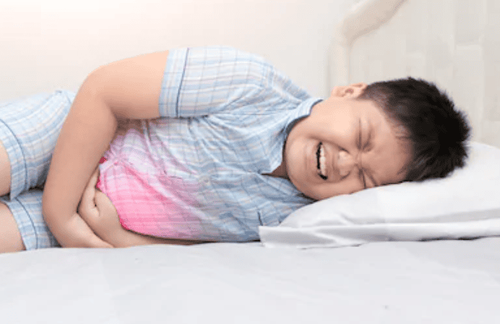
Bệnh tiêu chảy thường gặp ở trẻ vào mùa hè
Master, Doctor Ngo Thi Oanh - Vinmec Ha Long International General Hospital: Hello. Bloody diarrhea in children can be caused by the following reasons:
Dysentery: blood mixed with stools accompanied by mucus, bowel movements many times a day, fever, abdominal pain and straining. Intussusception: Children have intermittent abdominal pain, fresh blood in the stool, vomiting a lot. Typhoid: bloody diarrhea caused by typhoid: this is a complication caused by typhoid causing ulceration or perforation of the intestine. Gastroin- colon. You need to take your child to the doctor as soon as possible to properly diagnose the cause and treat the disease.
6. Nguyen Hong Ha (22 years old, a student at Hanoi Foreign Trade University): Hello, brothers and sisters, I would like to ask about the mother with food poisoning, should she breastfeed her baby? I just had a baby 3 months ago and am currently breastfeeding. Since yesterday, I have been suffering from food poisoning constantly feeling headache and nausea. Currently I do not dare to take medicine for fear of affecting the quality of milk, but my grandparents keep stopping for fear of infecting the baby. I don't know if a mother with food poisoning should breastfeed her baby, please advise. I am eating exclusively breast milk for 3 months, so I am afraid to change milk and not eat.
Master, Doctor Ngo Thi Oanh - Vinmec Ha Long International General Hospital: If the mother has food poisoning, vomiting and normal loose stools, there are no other symptoms attached, she will still breastfeed normally. because this poisoning does not affect milk.
If the case of dizziness, convulsions, tremors... that is, it is not a digestive disorder caused by food poisoning alone, but may be caused by botulism bacilli, or poisonous mushrooms, toxins of poisonous mushrooms. or of the botulism bacillus penetrated into the bloodstream, distributed throughout the body and possibly in milk, in this case the mother should not breastfeed.
7. Mr. Tran Van Dong (Hai Ha District, Quang Ninh Province): Dear doctor, this morning after eating breakfast about 30 minutes, my baby complained of nausea. After vomiting all the things in her stomach, she cried out that she was tired, didn't want to eat or drink water. I thought he had food poisoning, so I encouraged him to try to vomit, but it was only water. I gave him Oresol but worried that he was hungry but didn't know what to feed him, would you please advise what to eat after food poisoning to get well, doctor?
Master, Doctor Ngo Thi Oanh - Vinmec Ha Long International General Hospital: Children with vomiting, after vomiting should rest for 30 minutes to 1 hour, feed them again with powdered milk or porridge with lean meat, meat. chicken, eat a little enough water and electrolytes for the baby by taking oresol spoonful for children, sips for older children or coconut water.
Should choose bananas and eat less will help calm the stomach and reduce the feeling of nausea. White rice is the perfect food after food poisoning because it does not stimulate the stomach and provide enough energy for the body. Carrot soup will provide energy and help stabilize the stomach. Carrot soup is easy to eat and well digestible.

Súp cà rốt giúp trẻ ổn định dạ dày
8: Reader Dinh Thi Hai Yen (Email address: Haiyen195...@gmail.com): Hello doctor, My 10-year-old baby has food poisoning since yesterday. Today, it's better, but I refuse to eat white porridge forever because I'm bored. I have eaten for more than 1 day, so I am also afraid that eating white porridge forever is not enough and delicious, is there any kind of porridge that can be eaten when I have food poisoning, please consult a doctor so that I can change my diet. application for you with. Thank you doctor!
Master, Doctor Ngo Thi Oanh - Vinmec Ha Long International General Hospital: White porridge, cooked with minced lean meat, chicken, carrots or white rice are foods that are easy to digest and do not stimulate the stomach. The stomach contracts too much when having food poisoning, so children should eat many meals, the number of each meal is reduced compared to normal days.
If porridge has a lot of spices and other foods, it will stimulate the stomach, making the body more tired. In addition, you can replace porridge with carrot soup, chicken for easy eating.
9: Friend Hoang Thi Ngoc Anh (Hai Ba Trung, Hanoi): Doctor, my grandson sometimes has mild digestive disorders, I usually adjust his diet and he returns to normal. no need to take medicine. Yesterday, I went to eat with my friends and showed signs of abdominal pain and vomiting. I let her lie down and continue to exchange porridge with soup for her to digest easily. But recently, especially since the summer break, every few weeks, but it only takes 2-3 days to go away. I am wondering if it is because I have not properly treated my own poisoning at home, causing him not to be treated completely or not? Ask your doctor for advice on how to treat food poisoning at home and what to watch out for! Sincerely thank the doctor.
Doctor CKI Bui Thi Ha - Vinmec Ha Long International General Hospital: To treat illness at home when having food poisoning, you need to give your child more rest and rehydrate with oresol properly (must drink properly. the right way, mix the right ratio, the medicine will have the effect of small children taking each spoon, older children taking sips).
Do not share dishes, drink water to avoid your child being infected with other diseases as well as infecting others (because of poor resistance).
Eat lighter while sick.
If the disease recurs continuously, it is necessary to change food hygiene and safety habits. (Absolutely Do not go to restaurants), if after a period of time, it is no longer continued, it is due to a change in good living habits.
If it doesn't go away, you need to go to the doctor to find the cause.
10. Pham Thu Thuy's friend (Anh Hoa, Hanoi): Dear Doctor, my son vomited continuously last night, after he finished drinking 1 bottle of milk, 10 minutes later, he spit out the whole bottle. milk and food last afternoon. After changing the baby's clothes and giving oresol, the baby fell asleep for 15 minutes and spit it out again, this time don't come out with the oresol he just drank. Just spit and cough, after this time, I only dared to give him water and thermocouple, he found that he did not have a high fever but this time he was asleep, so this morning the family took him to the doctor, after the examination was completed. The theory is that the baby has a fever with food poisoning leading to digestive disorders. The doctor asked me what medicine should be given to young children with food poisoning and should they pay attention to care? My baby is over 1 year old, so it's been quite a while since we started eating solids!
CKI doctor Bui Thi Ha - Vinmec Ha Long International General Hospital: When a child vomits, it is important to pay attention to the position for the child to lie down with his head low, tilted to one side. Avoid lying on your back because of the risk of breathing in your lungs, causing life-threatening airway obstruction.
After vomiting, let the child lie down, but closely monitor if the child still vomits, has yellow-green fluid, or has bloody stools, the child should be taken to the hospital as soon as possible.
If you have vomiting, diarrhea, you need to rehydrate with electrolytes by drinking oresol solution (mixed according to the instructions on the package), older children sip by sip, small children spoon by spoon, or coconut water. Children should eat porridge with minced meat, chicken, and carrots well cooked.
11. Ngoc Trang's friend (D5 Building, Dang Xa Urban Area, Gia Lam, Hanoi): My baby is 2.5 years old, every time the weather changes, she has a fever with cough, runny nose, anorexia and poor appetite. There was a time with mild diarrhea, but several times to see the doctor, they all concluded that the fever was viral and did not prescribe antibiotics. This time the fever, I did not take him to the doctor, but only cleaned the nose and throat and self-treated with kumquats with alum sugar (stealing this medicine). However, after nearly 1 week, the child's cough and fever improved, but he noticed more red rashes on his chest, abdomen and back before spreading to his hands and neck. I did not see the baby showing signs of itching or discomfort. I was advised by an acquaintance that my child has a viral fever and a rash is normal, thinking that he is about to recover. Ask the doctor to help answer that is it right and when I have a viral fever with such a rash, do I need to take any medicine?
CKI Doctor Bui Thi Ha - Vinmec Ha Long International General Hospital: Hello! With your child's condition, it is necessary to let him rest in bed until the fever is completely gone.
Reduce fever for children properly: If the baby's fever is higher than 38.5°C, you can give him paracetamol according to the doctor's instructions, cool the child with warm water. Add enough water: children should be encouraged to drink enough water, mineral electrolytes, lemon juice, fresh fruit juice... to avoid dehydration. Give your baby a cough medicine of herbal origin to soothe inflammation and pain in the throat. Be careful when using honey for children under 1 year old. Feed your baby soft, easy-to-digest foods such as soup, dilute porridge, milk... Cleanse the skin and body fully, avoid wind and hydrophobicity by covering the baby with blankets, not cleaning the baby's body. If the child's fever does not improve, the child understands that he is comatose, has convulsions ..., you need to take the child to the hospital immediately.
12. Friend Tran Thi Hue (Tran Phu, Ha Dong): Hello Doctor, My baby is 3 years old, a few days ago suddenly had a fever, swollen lymph nodes in her neck, anorexia, fussiness. I went to the doctor and the doctor concluded that the fever was viral and gave me antipyretics. However, after lowering the baby's fever, for 2 days now, she has a rash, itching all over her body, sometimes with small petechiae on her arms and thighs. I don't know if it is due to the wrong use of antipyretic or if the baby is infected with typhus because during a common fever, the immune system is weak, so he will get more diseases? Is the baby infected with the virus? I don't dare let him scratch but he is very upset. Can you advise me if this symptom is dangerous, Doctor? Should I take my child to the doctor again? Hope the doctor will reply soon!
Doctor CKI Bui Thi Ha - Vinmec Ha Long International General Hospital: Viral fever, also known as viral fever, is often caused by many viruses, the most common being respiratory viruses. The disease is easily transmitted from one person to another through the respiratory tract, digestive tract, children have weak resistance, so they are more susceptible to the disease. Therefore, when sick, it is necessary to avoid contact to avoid spreading the disease to others around.
Symptoms are usually high fever, there may be symptoms of upper respiratory tract inflammation (red throat, cough, runny nose, ..), body aches and pains, possible digestive disorders, swollen lymph nodes, Tiny rash 2-3 days after fever, or red eyes, conjunctivitis.... the disease usually goes away after 5-7 days.
With the symptoms of your child as you describe, your child may have a viral fever, you need to strengthen your child's resistance by giving them enough nutrients, vitamin supplements from fruits, for them rest, personal hygiene and surroundings. If the child has a fever of ≥ 38.5 degrees, it is necessary to give paracetamol fever-reducing medicine at a dose of 10-15 mg/kg/time every 4-6 hours, drink plenty of water and supplement with oserol to prevent dehydration.
If the child's condition does not improve, the child has a lot of rash, the child has itching and scratching, causing infection, the child needs to go to the medical facility for re-examination.
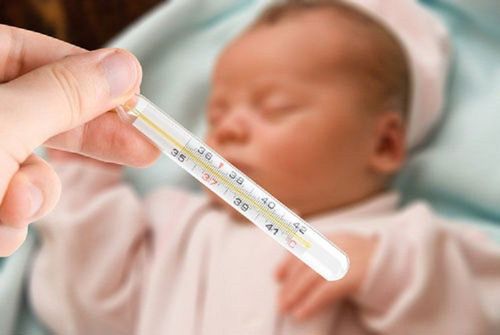
Bệnh sốt virus dễ lây qua đường hô hấp
CKI Doctor Bui Thi Ha - Vinmec Ha Long International General Hospital: Viral fever (viral fever) is a disease caused by a virus, so it can be spread from one person to another through respiratory and digestive tract. So you need to avoid your baby coming into contact with people around to prevent spread.
Signs of viral fever include: high fever, upper respiratory tract inflammation (red throat, cough, runny nose, ..), body aches and pains, possible digestive disorders, swollen lymph nodes, rash tiny 2-3 days after fever, or red eyes, conjunctivitis....
You can strengthen your child's resistance by giving them enough nutrients and vitamin supplements from fruits and vegetables. , for children to rest, personal hygiene and surroundings. If the child has a fever ≥ 38.5 degrees, it is necessary to give the child paracetamol at a dose of 10-15 mg/kg/time every 4-6 hours, drink plenty of water and add oserol to prevent dehydration.
14: Friend Nguyen Thi Thu (35 years old, Office worker): Doctor, yesterday when my son came home from school, he said he was tired and went to bed. When it was time to eat, he complained of nausea and refused to eat. At night, he had a fever, at the highest point, it reached 39 degrees. I gave him a fever reducer and checked, his throat was a bit red. I also have a headache. After about 3-4 hours of improvement, my son had a fever again, so I continued to give him a second pill. When I asked, I found out that his class currently has many students who are absent from school because of a viral fever, so I don't know if he has a sore throat. Usually or often viral fever from you. Ask the doctor to help a child with a viral fever, what are the common symptoms? Thank you doctor
Doctor CKI Bui Thi Ha - Vinmec Ha Long International General Hospital: Children with viral fever have signs including:
Whole body: Fatigue, body aches and then high fever 39 - 40 degrees Celsius. Fever in viral fever can be mild or very high, continuous or intermittent. Respiratory tract: children cough, sneeze, runny nose, red throat. Gastrointestinal tract: anorexia, nausea, vomiting, non-bloody diarrhea that may contain mucus or constipation. The disease is rampant from 3 to 5 days, then it will gradually decrease and disappear, the child will return to normal health. Transdermal: rash, appearing 2-3 days after fever. A generalized rash that causes itching, sometimes with small petechiae, is common on the inner arm and inner thigh. When the rash appears, the child's fever subsides. Other sites: Enlarged lymph nodes in the head and neck region, which may be painful or palpable. Red eyes and discharge, burning sensation in both eye sockets. Pain: Headache, muscle fatigue, lethargy and crying.
15: Pham Thi Thu Ha's friend (30 years old, Thach Ban, Long Bien, Hanoi): Dear doctor, my son is 4 years old this year and has had a fever for several days continuously. The family took him to the doctor and it was concluded that he was infected with a virus and was given Paracetamol fever reducer and treated at home. I want to ask the doctor what is the best way to take care of a child infected with a virus so that he can recover quickly?
CKI Doctor Bui Thi Ha - Vinmec Ha Long International General Hospital: Viral fever is an acute and rapidly spreading disease caused by a virus, lasting from 3 to 7 days. The most common manifestation in children is a sudden high fever from 39-40. The disease has no specific medicine but only symptomatic treatment with supportive measures.
Viral fever usually goes away after 5-7 days, when taking care of a child with a viral fever, parents should strengthen the child's resistance by giving them enough nutrients, vitamin supplements from fruits, children rest, personal hygiene and surroundings. If the child has a fever ≥ 38.5 degrees, it is necessary to give the child paracetamol at a dose of 10-15 mg/kg/time every 4-6 hours. Drink plenty of water and take oserol supplements to prevent dehydration.
If the child's condition does not improve, the family needs to take the child to a medical facility for examination.
Readers' questions continue to be answered by the doctor in the next section.




